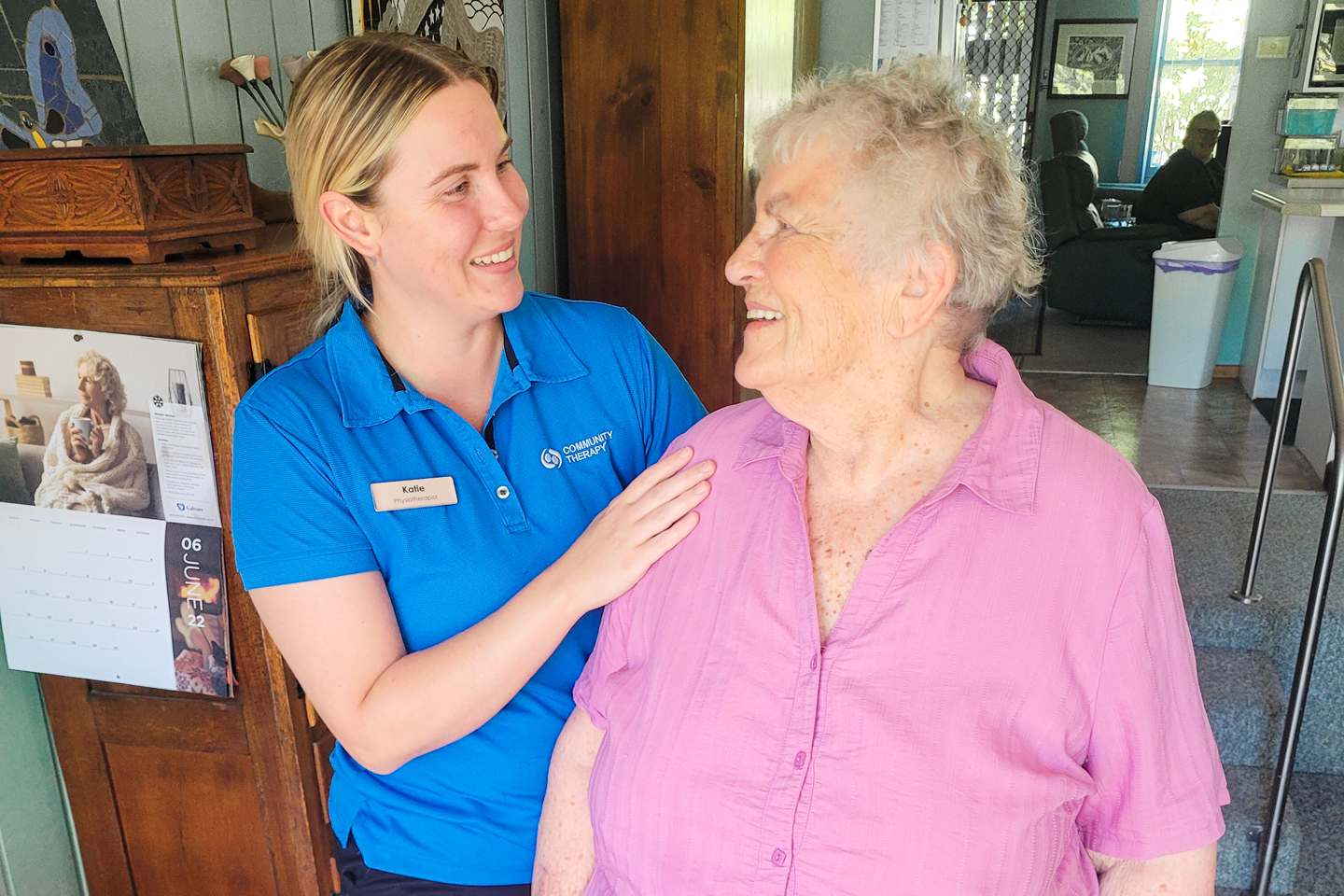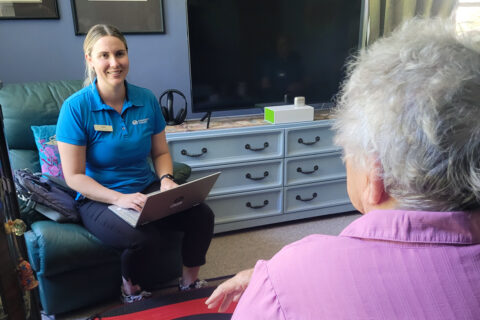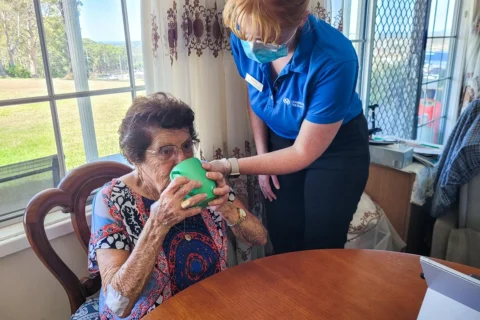Manual handling training is a critical component in various sectors, and it’s particularly vital in the aged care and disability sectors. These sectors require staff who are competent and knowledgeable about the correct procedures for supporting people, whom are often living with complex medical conditions and disabilities, to move safely.
This training is so significant to ensuring both client and carer safety that many organisations consider a certificate in manual handling training a mandatory requirement for all staff.
In this article, we delve into the significance of manual handling training in aged care and disability sector, in light of the Aged Care Quality Standards, the NDIS Practice Standards, and the Work Health and Safety Act.
Furthermore, we explore how online manual handling training now plays an important role in the provision of engaging and consistent training across the aged care and disability sectors.
Workplace Responsibilities under the Work Health and Safety Act
It is important to note that all workplaces in Australia have a duty of care to their employees and others under the Work Health and Safety Act 2011. This includes providing a safe working environment, adequate facilities, and information, training, instruction or supervision necessary for workers to perform their work safely.
Under this legislation, workplaces must ensure that staff who are required to do manual handling as part of their role are provided with appropriate manual handling training. This reduces the risk of injuries associated with manual tasks and ensures the health and safety of all workers.
General manual handling training about how to move safely is not appropriate training for aged care and disability workers. It does not cover the highly specific tasks completed in the aged care and disability sector, such as supporting someone to move in bed with a slide sheet or how to safely use a full hoist.
An example of a suitable training program is Community Therapy’s online manual handling training which is specifically designed for the aged care and disability sector.

Importance of Manual Handling Training in Aged Care
Caring for the elderly, whether in the community or within a residential aged care facility, involves numerous manual handling tasks daily. These tasks may include supporting someone to move in bed, transfer between beds and wheelchairs, or assisting them with daily routines. Inadequate manual handling techniques can result in injury to both the caregiver and the person being cared for.
Manual handling training specifically tailored to the tasks completed in the aged care sector equips workers with the necessary skills to carry out their duties safely.
For approved aged care providers, the Aged Care Quality Standards, established by the Australian Government, guide aged care service providers in delivering high-quality care to older Australians.
Approved aged care providers must provide appropriate manual handling training in order to meet the standards, particularly the following standards:
Standard 1: Consumer Dignity and Choice – Manual handling training ensures that caregivers can respect the individual’s autonomy by assisting them safely and appropriately, allowing for greater personal control and freedom.
Standard 3: Personal Care and Clinical Care – Appropriate manual handling procedures are paramount to providing safe and effective personal and clinical care, minimizing the risk of injuries to both the consumer and the provider.
Standard 8: Organisational Governance – This standard requires that organizations take responsibility for all care and services, including their safety and quality. Regular manual handling training helps organizations maintain a safe and competent workforce, thus adhering to this standard.
While there is no specific requirement in the Aged Care Quality Standards about the frequency of manual handling training, it is recommended that it be updated annually to ensure that all staff members’ skills and knowledge remain current.
Approved aged care providers are able to engage Community Therapy’s online manual handling training and customise a package of individual modules specific to the tasks regularly completed by staff.

Community Therapy is also able to support approved aged care providers to review their current manual handling policies and procedures and competancies.
Manual Handling Training for Disability Support Workers
Working with people with disabilities also involves frequent manual handling tasks. Disability support workers often assist with personal care, mobility, and various activities of daily living.
Manual handling training for disability support workers provides them with the skills needed to prevent injuries. It involves training on safe lifting techniques, using equipment such as hoists, and understanding the unique needs and considerations for people with disabilities.
For approved aged care providers, the Aged Care Quality Standards, established by the Australian Government, guide aged care service providers in delivering high-quality care to older Australians.
Registered NDIS providers, the NDIS Practice Standards, estabilished by the NDIS Quality and Safeguards Commission, guide NDIS providers in delivering high-quality care to people living with disabilities. NDIS providers need to ensure staff have access to manual handling training to ensure they meet the standards, particulary the following standards:
Standard 1: Rights and Responsibilities – Providing supports that are person-centred with privacy and dignity require appropriate manual handling skills.
Standard 2: Provider Governance, Risk Management, Human Resources – Manual handling injuries, including those associated with supporting people living with challenging behaviours, are one of the highest risks for providers to manage. Manual handling training enqures staff have the opportunity to develop their skills to decrease the risk of injury to themselves and those they are supporting.
Standard 3 & 4: Provision of Supports and Provision of Supports Environment – Providers must ensure that they have the appropriate manual handling equipment and staff with the appropriate manual handling skills to support them.
High Intensity Daily Personal Activities & Specialist Behaviour Support Module – Providers must ensure that staff have the appropriate skills to deliver complex manual handling involved with tasks such as bowel management and when supporting people living with challenging behaviours.
As with the aged care sector, annual refreshers in manual handling training for disability support workers are recommended to ensure compliance with NDIS Practice Standards.
Registered and unregistered NDIS providers are able to engage Community Therapy’s online manual handling training and customise a package of individual modules specific to the tasks regularly completed by staff.

Community Therapy is also able to support NDIS providers to review their current manual handling policies and procedures and competancies.
Online Manual Handling Training
The digital age has made it easier than ever to access quality training. Manual handling training online provides a flexible and convenient option for those who may not be able to attend in-person courses. This is particularly relevant to aged care and disability providers with mobile and geographically spread out teams.
Online training platforms allow you to learn at your own pace and at a time that suits you, reducing the disruption to your work and personal life. It also ensures that training provided to teams is consistent and can be reviewed or refreshed at any time, on demand 24/7.
Community Therapy’s online manual handling training is specifically designed for the aged care and disability sector. It is structured into small, bite-sized modules so can be completed flexibility in sections or all in one sitting.
Frequently Asked Questions about Manual Handling Training
Here, we address some of the most frequently asked questions about manual handling training in the aged care and disability sector in Australia.
1. How often should manual handling training be renewed?
In Australia, it is recommended that manual handling training is updated every year. However, the frequency may depend on the requirements of individual workplaces or changes in legislation.
2. Can I complete manual handling training online?
Absolutely. There is no requirement for manual handing training to be completed in person. Often, online training forms a component of an organisations risk management strategy and online training allows an organisation to shift in person risk management from training to in the field supervision and competancy iniatives. Contact us at Community Therapy if you or your organisation needs assistance to develop a manual handling risk management plan for your organisation.
3. Do all aged care and disability support workers require manual handling training?
Yes. Because of the nature of the work in aged care and disability support, all workers in these sectors should complete manual handling training to ensure they are conducting their duties in a safe manner.
4. Is the manual handling training certificate recognised nationally?
General manual handling training is not suitable for the aged care and disability sector as it does not cover the specific tasks completed by aged care and disability workers. Consequently, workers and organisations should implement training that is specific to the sector, such as Community Therapy’s online manual handling training.


 November 27, 2024
November 27, 2024

